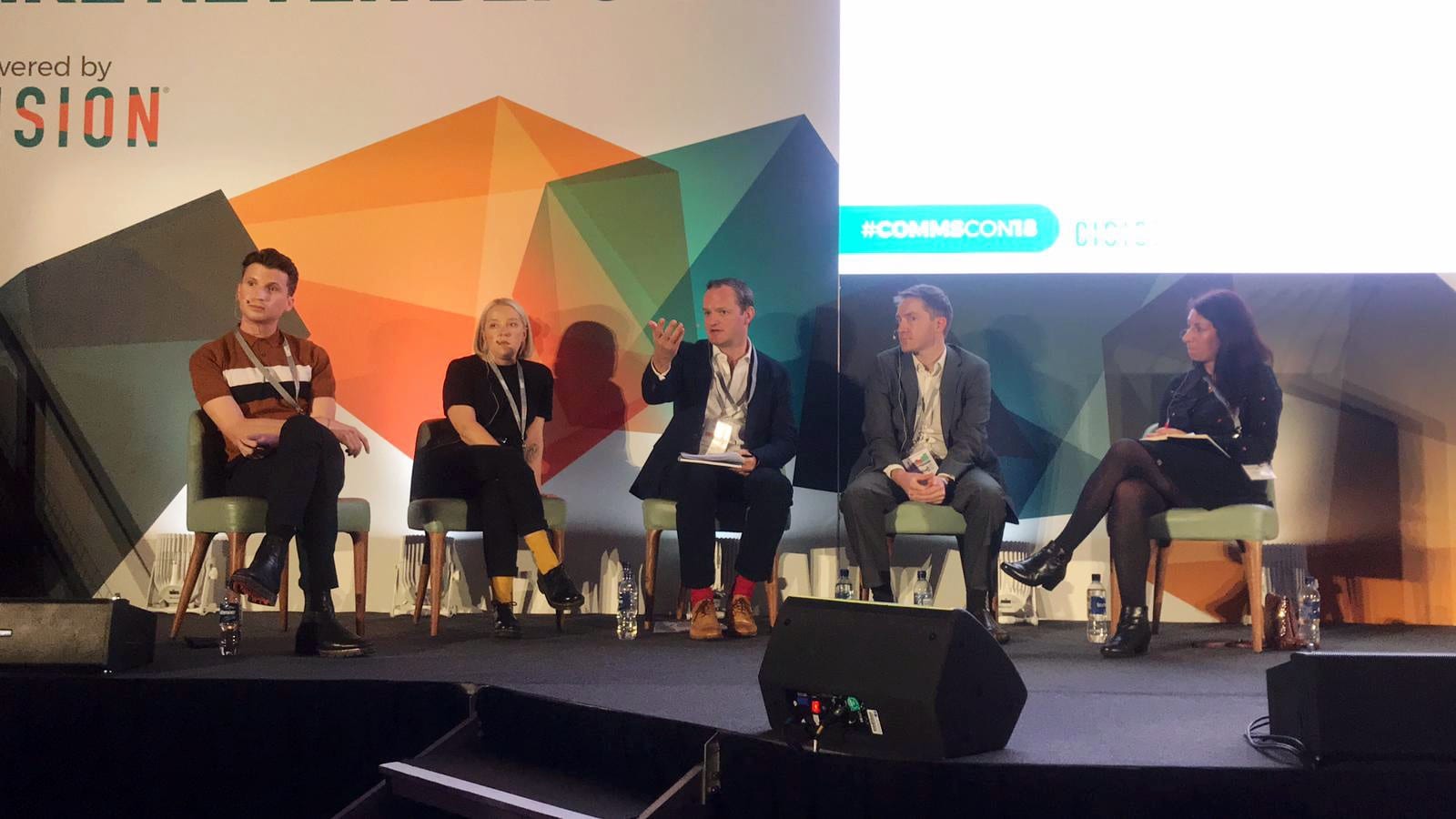OK, so many of us in the communications industry already have great relationships with journalists but what I learned this week at the inaugural communications congress #CommsCon18 in London was that as an industry we can still do a lot better. What Journalists Want was the theme of an hour-long panel I chaired focusing on what works for journalists, what doesn’t and how earned media is changing.

L-R: Josh Newis-Smith, celebrity & entertainment editor, Glamour; Ellen Stewart, head of content, PinkNews; Richard Griffiths, director, strategic communications, Ketchum; Paul Hodkinson, comment editor and assistant editor, Financial News; and Nada Farhoud, consumer features and environment editor, Daily Mirror.
I can’t say I was entirely without nerves taking this gig. More than 900 in-house and agency colleagues passed through the event on Tuesday but my task was made easy by absolutely stellar panellists – wildly different personalities who spanned the media mix. The gregarious Josh Newis-Smith, celebrity and entertainment editor at Glamour who has millions following his YouTube channel, Paul Hodkinson, assistant editor at Financial News, Nada Farhoud, the hard-hitting consumer & environment editor at the “intelligent tabloid” the Daily Mirror, and Ellen Stewart, head of content at the LGBT website PinkNews.
The biggest learning of the session was that journalists know what they want, what works for them and how they like to operate. And whilst at times the panellists disagreed on issues, such as whether they cared about celebrity influencers (Josh at Glamour’s meat and drink, Nada at the Mirror couldn’t have cared less about them for her stories), what united them was the pride and responsibility they felt for their trade – and getting the story right. They ALL said, know us, do your research and most importantly, just ask.
So you might think the needs of the press have been discussed ad nauseum – but trust me, this is, and always will be, a totally different conversation each time it happens. Here are a few takeaways from our chat to help you consider your own approach to media relations.
Relationships are key
Avoid getting in touch with journalists simply to see if they’ve received your press release. The panel told us this still happens all the time! Having a genuine interest in a journalist and what they cover is so important to not only build a rapport with them, but also be able to pitch story ideas to them confidently, as you’ll be more aware of the type of content they cover. Forging relationships in an authentic and collaborative way with journalists at different levels – from the junior staff writers to the editors – is important if you want to be taken seriously. As Paul said, “research [about the journalist] and maintaining the relationship will get results.”
No one size fits all
Email, phone or DM or Instagram to pitch a story? It entirely depends who, why and when you’re contacting them. Building a solid relationship from the start will ensure you know the answers to all of these. For example, Josh shared that he routinely receives pitches for Glamour on Instagram and WhatsApp, while for Ellen, this was “a bit creepy”, and getting to know her beforehand would do the trick.
The perfect pitch?
There is no such thing. What’s important is knowing why a story would matter to a journalist. As Nada explained, journalists are increasingly having to wear multiple hats (she writes for the travel pages as well as being a news reporter) and therefore have limited time and attention. If you can make your content matter to them, and quickly give them access to the right people or research, then you have a far better chance of landing that prized piece of coverage.
Do your homework
In a media environment wrought with mistrust, we, as communicators, can help journalists combat fake news. Be accurate and truthful in everything you communicate. All panellists agreed that there is increased pressure and responsibility on them as journalists to get facts double, triple-checked. PR needs to do its bit to help. Trust is our currency as much as theirs.
Influencers and sponsored content are transforming journalism
Social influencers are on the rise and the lines between sponsored content and news are becoming increasingly blurred. Journalism, therefore, is becoming way more than simply news and opinion. And this is why it’s imperative for us to be clear, internally, on what is hard news vs what needs to be communicated in a slightly different way. Ellen, for instance, shared that she would “never run a campaign that doesn’t sit in the right way with the brand”. Sponsored content must be relevant to both the brand and her publication.
It sounds simple but what we can easily forget when we’re under pressure to deliver for brands and clients is that ultimately, relationships and relevance are everything. The panellists agreed that all journalists today are now producing more content than ever before with less resources to do the job. That’s where we can help but we have do it right – and as practitioners, also counsel our clients on what is achievable. Asking for brand hyperlinks in news stories, for example, can undermine our relationships and our client’s reputation. So the parting message from each panellist was: get to know what we want to write – and if in doubt, take us for a quick coffee – or at least talk to us!


